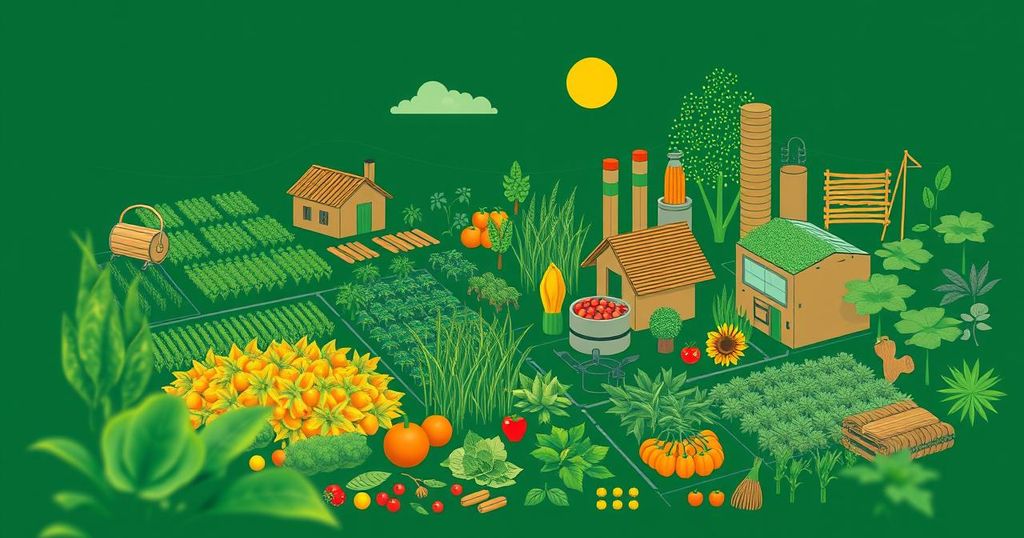Green Transition as a Cornerstone for the Future of the Agri-Food Sector
A global panel has advocated for an innovation-driven green transition in the agri-food sector to combat climate change challenges. While some regions benefit initially from warmer temperatures, significant disruptions in agriculture are noted. Experts emphasize the need for technological advancements and sustainable practices, with a particular highlight on China’s efforts to increase food production and support global food security.
At the recent 2024 World AgriFood Innovation Conference in Beijing, a global panel of agrarians urged an innovation-driven green transition within the agri-food sector to reduce carbon emissions and address the pressing challenges posed by climate change on food production. Though some regions have initially benefited from increased temperatures, significant uncertainties related to global warming are increasingly disrupting agriculture in Asia, Africa, and South America. Sun Qixin, the president of China Agricultural University and an academician at the Chinese Academy of Engineering, emphasized that mainstream models predict a 6% to 8% decrease in food production for every one degree Celsius rise in global temperatures unless technological innovations are deployed to mitigate these effects. Despite some beneficial impacts of warmer climates, such as boosted yields in previously cooler, drought-prone areas, sudden and severe weather changes have led to agricultural upheaval worldwide. For instance, recent extreme droughts and heat waves have caused significant crop failures in Brazil and China’s Henan and Shandong provinces. Sun pointed out that transitioning to greener practices will necessarily involve a reduction in agricultural inputs like fertilizers. He stressed the importance of investing in research and technological advancements to ensure that such transitions do not compromise food production. “We must proceed in this direction despite the challenges,” he stated. The Intergovernmental Panel on Climate Change has reported that the agri-food sector accounts for approximately one-third of global greenhouse gas emissions, encompassing the entire food production lifecycle, from cultivation to consumption. Fu Wenge, another professor at China Agricultural University, indicated that achieving innovations necessary for this green transition may not require breakthrough science; rather, minor, cost-effective alterations in management techniques can yield substantial results. Fu highlighted initiatives such as the Science and Technology Backyard project, where students collaborate with smallholding farmers to promote high-yield and environmentally friendly agricultural practices. This model has been successfully implemented in Africa and beyond. Ismahane Elouafi, the executive managing director of CGIAR, advocated for innovations across technological, policy, and institutional levels to foster a green transition, emphasizing the urgency as climate change impacts escalate. Patrick Caron, vice-chair of the CGIAR system board, remarked on humanity’s historical capacity to enhance food production while adapting to changing consumption patterns. He noted, “However, at the moment, we are looking at the increase of production with a different angle,” highlighting the need for environmentally conscientious methods. In light of World Food Day, which aims to elevate awareness and action against hunger, the conference underscored China’s ambitious target of elevating its food production capacity to around 700 million metric tons by 2030, an increase from 695 million tons in 2023. Elouafi characterized China as a pivotal player in the global agricultural landscape, stating, “China really is a bright spot in the global picture, not only in increasing productivity in a very smart way, but also in reducing poverty and hunger.” Mao Ning, a spokesperson for the Foreign Ministry, noted that China produces a quarter of the world’s food on just 9% of the arable land, emphasizing the nation’s commitment to global food security through assistance to countries in crisis and sharing agricultural expertise. “China has provided more funding and experts and undertaken more projects than any other developing country under the framework of the Food and Agriculture Organization’s South-South Cooperation Programme,” she added.
The article discusses the urgent need for a green transition in the global agri-food sector, particularly in the context of climate change and its effects on agriculture. Experts from the recent World AgriFood Innovation Conference emphasize the importance of innovation to reduce carbon emissions and enhance food production resilience. The contributions of significant figures from this conference, including their insights on technological advancements and sustainable practices, provide a comprehensive view of the challenges and potential solutions facing global food security.
In conclusion, the call for an innovation-driven green transition in the agri-food sector highlights the dual challenges posed by climate change and the need for sustainable food production. The insights from leading experts underscore the importance of technological advancements and collaborative efforts in achieving a resilient food system. China’s proactive stance in enhancing food production capacity and global food security exemplifies a model that could benefit other nations, particularly in the developing world, amidst increasing food insecurity.
Original Source: news.cau.edu.cn




Post Comment